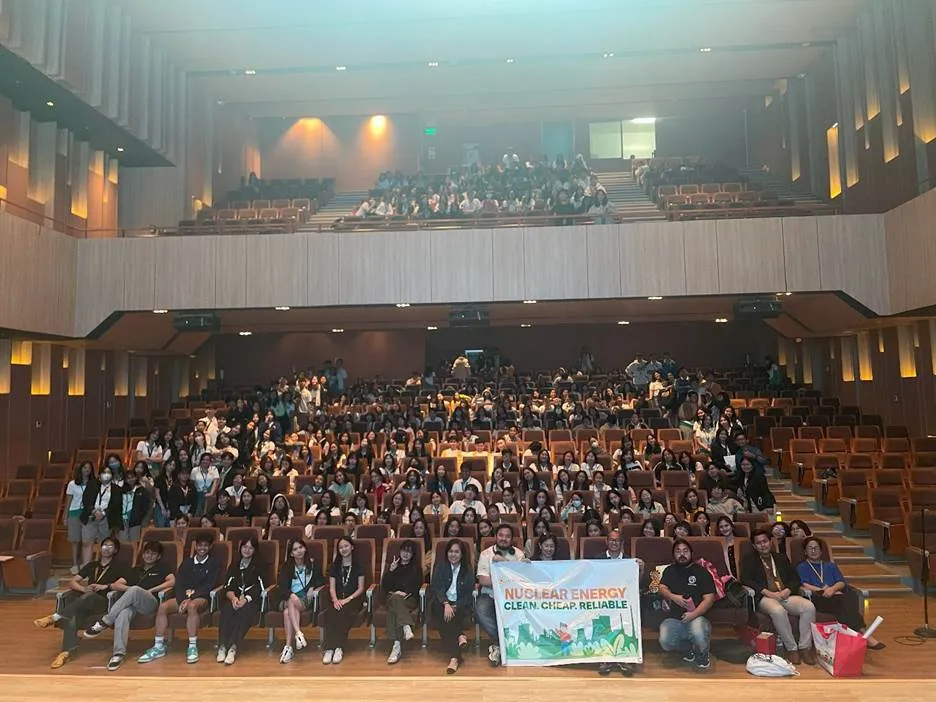Empowering the youth to shape the nation’s energy landscape, Alpas Pinas challenges students to champion nuclear energy advocacy

Manila, Philippines – March 25, 2025 – Alpas Pinas, a non-stock, non-profit organization advocating for clean, cheap, and reliable energy, led an insightful discussion on the role of nuclear energy in the Philippines’ future at an event hosted by the University of Santo Tomas Senior High School (UST-SHS) Humanities and Social Sciences (HUMSS) Faculty. Addressing the students, Alpas Pinas emphasized how nuclear energy can provide a reliable power source while promoting inclusive and sustainable development.
The event aimed to cultivate socially engaged, transformative, and globally aware Filipino citizens committed to social transformation and sustainable development while also opening a conversation on how the youth can become leaders in nuclear advocacy in the Philippines.
Spearheaded by Alpas Pinas Lead Convenor Gayle Certeza along with members of organization Gabrielle Andrea Tresvalles and Augustine Narcida, they addressed the common misconceptions about nuclear energy while also understanding the current energy landscape in the Philippines and the energy crisis the country is currently facing.
Certeza opened the discussion by educating students on the country’s reliance on fossil fuels, highlighting that 78 percent of the Philippines’ energy comes from these sources. She explained that coal-fired power plants burn vast amounts of coal to generate electricity. This process, while sustaining modern conveniences, releases harmful pollutants into the air, water, and land, contributing to environmental degradation.
“So, what does that mean? Nuclear energy not only eliminates greenhouse gas emissions but also provides a denser energy source capable of meeting our electricity needs for future generations,” said Certeza.
Tresvalles highlighted how the youth will be the number one beneficiary once nuclear energy becomes part the energy mix, as it will create jobs for people and how it will provide energy security in the future.
“As young as we are now, we have the opportunity to engage. I strongly believe that our students here can contribute to research and policymaking that will shape how energy is produced, consumed, and distributed. This conversation goes beyond nuclear energy—it intersects with health sciences, ethics, governance, economics, and social justice,” Tresvalles reiterated.
Narcida, on the other hand, highlighted the crucial role of Artificial Intelligence (AI) and the significant amount of electricity required to sustain the technology that students enjoy today.
For instance, a single use of ChatGPT, the widely known generative AI platform, consumes approximately 12 minutes’ worth of a laptop’s battery charge. With ChatGPT receiving around abillion queries per day, this translates to about 12 billion minutes of laptop energy consumed daily. As AI’s energy demand continues to rise, electricity costs are expected to surge. Without a reliable energy source, neither AI nor future technological innovations can thrive.
“You may choose to believe me or not, but at the very least, believe that this is the future—because we need energy. We are falling behind, and that’s a problem,” Narcida emphasized.
During the fireside chat, Certeza emphasized the youth’s role in driving change in nuclear energy advocacy. More than just supporting policies, she noted that change begins with young people initiating conversations about it.
“Share it with your family, friends, and on the internet. That’s the advantage of your generation, you’re more expressive and braver in sparking discussions about what can help the country progress. Keep that fire in your heart, and you can help us in this fight,” Certeza urged.
Tresvalles echoed this sentiment, emphasizing that nuclear energy advocacy is about young people becoming activists in their own ways.
“How can you help? Be an activist. The fight to secure clean, cheap, and reliable energy for the Philippines is in our hands. You have the power to change the future. Believe in yourself and become the change you aspire to be,” Tresvalles concluded.
UST-SHS Faculty Member Leilani P. Arocha expressed her hope that the event provided valuable insights and encouraged students to think critically about the country’s energy landscape.
“I hope that through this discussion, our students have gained a deeper understanding of the role energy plays in our daily lives and how crucial it is to advocate for sustainable solutions. This is more than just a lesson in science or policy—it’s about shaping the future of our nation,” Arocha shared.
The event not only sparked meaningful conversations about nuclear energy but also empowered students to see themselves as key players in the country’s journey toward a more sustainable and energy-secure future.
